ANNOYED BY POP-UPS?
You can avoid this one by signing up ;)
Get Reid's recent blog posts sent to your inbox.
THANKS FOR
HELPING AN
OLD GUY OUT!

A contingent of Carol’s family recently headed off to Portland, Oregon for the holidays. Since I had made a couple of train trips there, I was asked to recommend places to go and sights to see. As the experienced reader of this blog may have immediately discerned, I had precious little to offer. Outside of the famous Powell’s bookstore, there was the historic landmark of the city’s Union Station, which I was aware of only because that’s where I had disembarked from Amtrak. There was the homeless encampment surrounding the station, the motel with the iconic 1950s era sign, where I stayed quite cheaply, and a sports bar near a strip joint that had been located within walking distance from the train station.
READ MORE

What you crave in reading a travel narrative is the unexpected, a taste of fear, the sudden emergence by the roadside of a wicked policeman, threatening harm.
READ MORE

I was reading a travel narrative, and the writer used a word that struck me in an epiphanal way. Theroux was describing his coastal tour of Britain (The Kingdom by the Sea) as “long coastal stretches of decrepitude.”
That I wanted Carol and I to see what he was writing about on our own upcoming trip (“…what had been villages well served by railway lines had become curiously anorexic-looking and tumble down, somehow deserving the epitaph from ‘Ozymandias.'”) struck me as very odd: I wanted to sightsee. As I read on (“defunct viaducts, abandoned cuttings, former railway stations, ruined railway bridges) it occurred to me Theroux was describing what 1500 years from now would be the ancient ruins of a then former world empire. The funny thing is the current existing sites of 1500 year-old ruins hold no interest for me. In fact little is more boring than a well-preserved and properly docented or audiophoned historic pile of slave-constructed rocks, except for maybe the section of medieval religious paintings in a typical European art museum.
